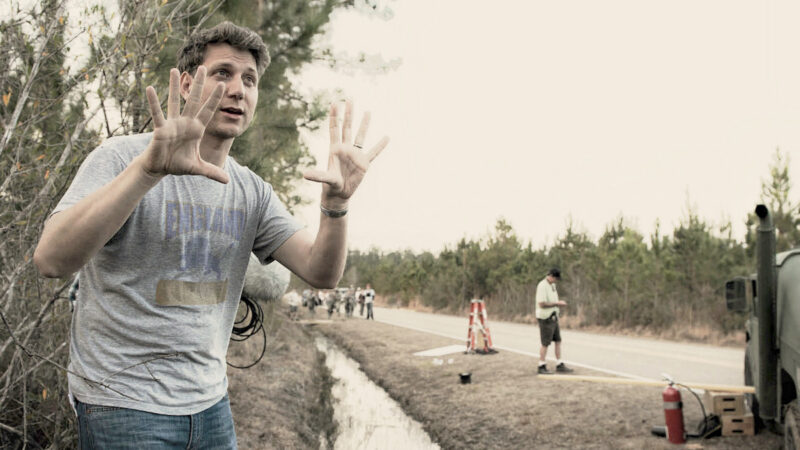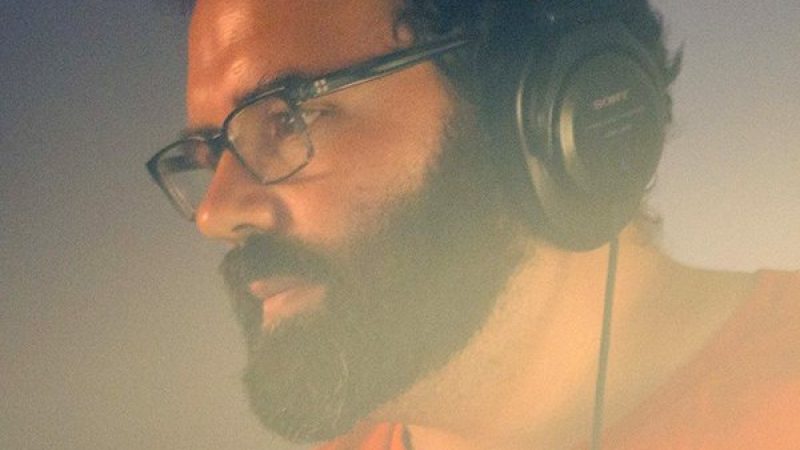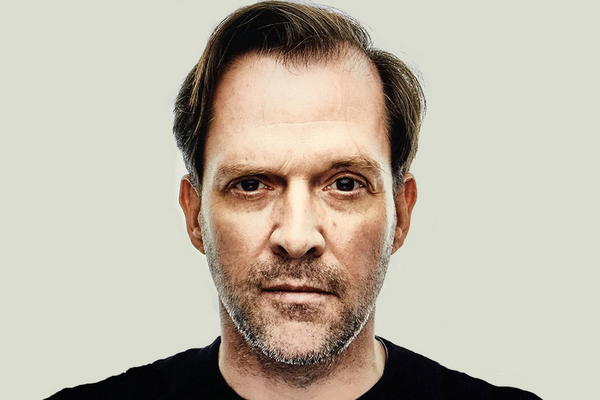
Ford Austin by James DiPietro
Thank you for having me on your website. I am a huge fan. I actually got my start very early on. At 1 year old, my parents put me in a movie called “30 Dangerous Seconds”. It was a scene at a wedding in a park where I was being held in a woman’s arms. After that, I got into a casting service and agency for kids in Dallas, Texas. Everyday I left school at to go on auditions and bookings on some pretty cool shows.
After high school, I chose to enroll in a drama program at Oklahoma city University where I did a ton of theater. After undergrad, a director friend told me about U.R.T.A. organization. who had auditions annually for Masters program scholarships. I drove to their auditions in Chicago and won full scholarships to 16 universities around the US. I chose Temple University because of it’s 3 year conservatory program where you study acting, dance, stage combat, voice & movement and everything else you would ever want to know about theater…and they paid me to attend.
News from the #BuffaloDreamsFantasticFilmFestival! #Gorgeous #actor @angrybabymonkey won #BestActor for #SixPackSam! https://t.co/WiNKJmk3vw pic.twitter.com/ocPxp7aAac
— Gorgeous Media Group (@GorgeousMediaUS) November 6, 2017
From there I sprung into stage work in New York City on NBC’s Another World soap opera until it went off the air in 1999 and Death of A Salesman with Ralph Waite; loads of commercials and other Off-Broadway plays. After that, I booked a Broadway level show called “Lawyers” with Kevin Conway and a beautiful actress I eventually married and never looked back until the draw of making movies started to pull me towards Hollywood. Dun, Dun, Duuuun!
indieactivity: What acting technique do you use?
Ford: I have always believed that we never really use one style or technique of acting but rather draw from all teachers who have come before us. My first exposure to acting as an adult was Stanislavski in Acting 1. Along the way, I studied Lee Strasberg, Uta Hagen, Sanford Meisner and lots of Improvisation schools like Del Close’s work and The Groundlings.
Generally you picture actors finishing school and just working without ever training again. Not so for me. Five years ago, I returned to training after a near death car accident that paralyzed me and put me in the hospital for 6 months. Once I recovered and was able to start working again, Martin Landau started mentoring me and invited me to observe and eventually work on rebuilding my craft at The Actors Studio in Los Angeles & New York City where I focused on Lee Strasberg’s teachings, scene work, Sense Memory and “Substitutions” along with “Emotional Memory” exercises with Lisa Richards, Penny Allen, Cathy Leslie and legendary actor/director Lou Antonio everyday for four years.
I now use the skills I learned from Marty and everyone at The Actors Studio as the cornerstone of my approach to all my work. After those intense years of training, I was inducted as a Lifetime Member at The Actors Studio where I still keep in shape.
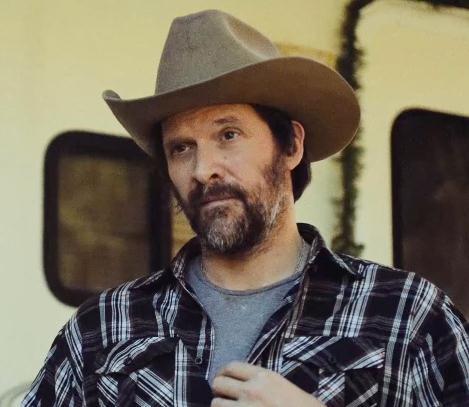
Ford Austin as Sergio in “Six Pack Sam’ Directed by Joe McReynolds
indieactivity: You are an experienced actor, how much work do you put into your scenes?
Ford: At this point in my career, I dedicate my entire life to each part I play. Whether it is on stage, on camera or even on a web video, I have learned that I work best when I go deep undercover in the roles I play. I do many of my daily activities as if I am that character. I will always wear my character’s clothing or costumes suggestions which I assemble from my own closet to every rehearsal and keep items from their life in my pocket when I am not at work.
I try to visit the places where the character is from to get a feeling of their surroundings if possible. Martin Landau taught me to “Always be exploring” and I find that the best way to do the is to allow the characters I play to have access to my whole life and not to compartmentalize myself away from the work. I am my own instrument so I use every bit of myself: my fears, my desires, my hates, my loves, etc. in every part I play.
indieactivity: You’ve worked on the most popular TV Shows: Charlie’s Angels, CHiPs, Magnum P.I., Family Ties, The A-Team, Saved By the Bell, Saturday Night Live, Scorpion Girl, Wicked City.?
Ford: I would say that each collaboration in my career has helped immensely. Definitely, the earlier stuff helped me to understand what it is like to be on a set. Later on I was able to appreciate the collaboration much more.
I was working on an episode of Saturday Night Live in the 1990s which featured Helen Hunt as the host. One time during our rehearsal, I was backstage feeling bummed out that I wasn’t one of the full cast members of the show and Jim Brewer (such a great guy) stopped me and said, “Hey man! You’re here! You’re here!”. His words have stuck with me on every job I have had since. That Saturday night on the live show, Jack Nicholson snuck into the show in a sketch we did. Literally, only a few people at the top like Lorne and the writers knew he was coming.
Out of all that I did, it was an incredible experience to be part of a scene that my longtime acting hero Mr. Jack Nicholson created on the show. We were all going nuts. Years later, my mentor Martin Landau told me he had taught Jack and Harry Dean Stanton acting in New York City when he started. So meant to be!
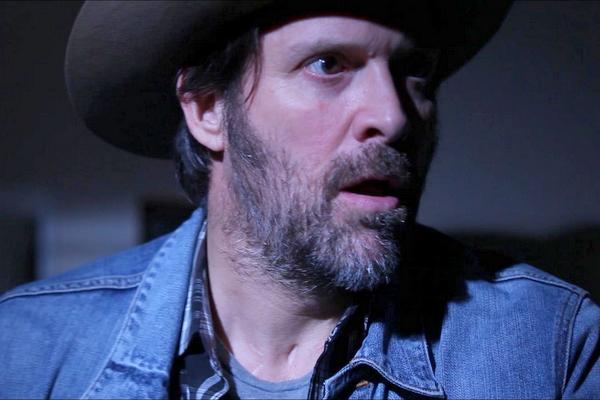
Ford Austin as Sergio in “Six Pack Sam’ Directed by Joe McReynolds
indieactivity: How does the work on short films (Dog Gone: A True Story, Cerebral Print: FIle #0604, The Great Train Robbery, Manstray, Hi, I killed the World, Dark Readings, Tales of Absolute Debauchery, Adam & Short), compare to TV movies, say Fitz & Slade, Bambi Cottages? ?
Ford: My favorite thing about short films is the freedom you get from the directors. Short films are often made by student directors or directors trying to break new ground. As a result, the direction is way more collaborative.
My favorite was Family Tree which was directed by Vicky Jenson (Shrek & Sharktale). I had a huge monologue at a dining room table with eight or so other characters whose shots needed to be covered. I was allowed to make all my personal choices and inflections with the monologue I was telling. I had really looked to find fun stuff to fit between the lines and the whole shot was about 2 minutes on 35mm film with a huge Panavision crane hovering over the table towards my face.
Thankfully, Vicky allowed me to bring myself to the role and as a result, I nailed it and survived the editors cut. We premiered that at Sundance Film Festival and played tons of festivals around the world even winning the Jury prize at SXSW in Austin, Texas, which you know I loved the most!
Recently, on Scorpion Girl I played Adolph Hitler. That one was incredibly intense because of my habit of staying in character as much as possible. Also, I had to learn all my lines in German. That is a very cool series pilot we made for Netflix in 2017.
The bottom line about Short films is they are a great way to explore and push yourself to the limit . They are also much easier to get programmed into a film festival. The shorter the Short, the more opportunities you have to get selected at the big festivals and have other filmmakers see your work.
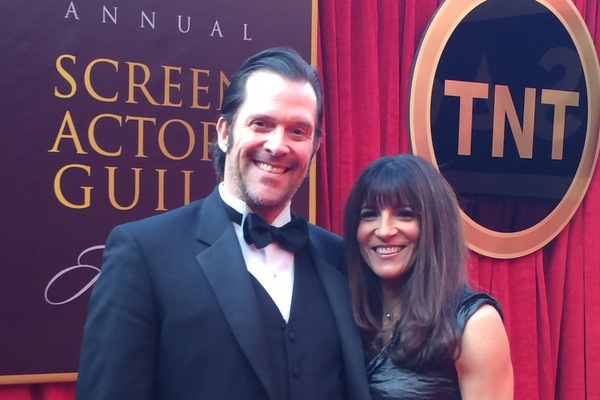
Ford Austin at Screen Actors Guild
indieactivity: Let’s focus on your work on video, All-American Murder, Psychon Invaders, Slaughter Party, Evil Ever After, The Blood Mask: The Possession of Nicole Lameroux, iPhone Dance Dance Revolution, Naked Horror, Carnies, Zombie Babies.
Ford: In the world of video, I have noticed it is more “fly by the seat of your pants” than other mediums. Some of these feature films are purely for the producers to make a buck. As a result, many of them are crunching budgets and the number of shoot days so they have a better chance to make a return on their investment.
Some of these films are really good like the ones that Fred Olen Ray and his son Chris Olen Ray make. Then there are others that turn into a bit of hell where they shoot in old run down buildings where you really think you are going to die as you fight giant space rat puppets (See Rat Scratch Fever by Jeff Leroy) in the desert without enough craft services or sunscreen.
In these projects, we will rarely get to rehearse. You are expected to show up and do what you are told. But, as an actor, a part is a part and we cannot turn them down. So, you do as much of your own work on the role and “Bring it” because the director has almost no time to help you with making choices. I look at them as a baptism by fire because if you can work under those conditions, you can do any job that ever comes your way. Also, there is a kind of joy in doing them because the community of filmmakers who make them is so close knit. We are all like family.
indieactivity: When you shoot a feature as an actor, how do you create character from a script into a person?Ford: The great thing about creating my character from a script is that most of my answers are already in the script. It is 33% the script, 33% myself and 33% the world around me. In the script, I look at what my character says about himself and what other characters say about him as well. I take these script “nuggets of character description” and blend them with myself personally. Then I look at the world that the character lives in and use that to make my character habits three dimensional.
For instance, when I played John Fitzgerald Kennedy in the Tragedy of JFK, I took the information from the script and what we learned about Kennedy from what his family and friends said about him. Then, I blended those qualities with the similar qualities in myself to create my version of JFK as opposed to doing an impersonation of a historical figure. Then I researched the time period of our script, which was 1963 at the time of his assignation just after the Bay of pigs which Kennedy had gotten the US out of. He was at the peak of the public liking him. He was also at the peak of his philandering and another group of politicians dying to remove him and his family from politics altogether.
So, I took his charm to be his most playable quality for me. It worked. Another thing in this production, the amazing director, Daniel Henning, did not really direct my character process much, but rather gave the entire cast books and photo albums to research for ourselves.
Bottom line, since studying with Martin Landau at The Actors Studio, I use quite a large amount of substitutions and sense memories wherever I can. That is the part of myself I try to bring to every character I play. Essentially, when I am on camera or on stage, it is the version of myself I am putting into the circumstances.
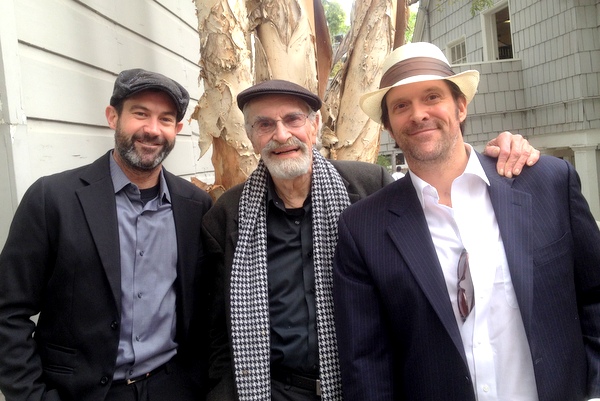
Ford Austin with Martin Landau
indieactivity: You have worked on features such as, Dead in Love, Porkchop, Hoops: Its Not Just a Game, Dahmer vs. Gacy, Falling Down, Rat Scratch Fever, Insignificant Celluloid, Showgirls 2: Penny’s from Heaven, The Ghostmaker, Aliens vs, A-holes, Noirland, The Tragedy of JFK. If you consider a timeline of these productions, how did they improve your craft as an actor-Producer?
Ford: There is a distinct division between my career “before” The Actors Studio and “after” The Actors Studio. My craft really blossomed in those four years of study at The Actors Studio. If you look at any of my work prior to 2012, it is good. Especially the double role performance I pull off in Dahmer vs. Gacy.
However, there is a group of feature films short films, plays and even web series I shot from 2012 to the present where you can see a depth to the work that just wasn’t there. It’s as if my characters are coming to life right in front of you. All of the stakes and personal struggles they are coping with are very real.
Of all those projects you listed, only three features were made after 2012: The Tragedy of JFK and Six Pack Sam and Heels. The work is really effortless and connected to a deeper personal place in these films.
indieactivity: How have you built so much craft over the years, does this make production on shorts, Tv movies, or features easy to work through as an actor?
Ford: The best way to be the character in a role is to just morph into that person and not break character. Unless they are a dangerous psychopath, I commit 100%. In between takes, I don’t chat with people. I put on headphones or go away to a trailer or dressing room to focus on my next scenes. This has really developed over my life as an actor.
I look at my career in stages. Childhood: where I really had no clue what I was doing but still had a blast acting whenever I could. College: : where I first studied Stanislavski and performed dozens of plays ranging from Shakespeare’ Hamlet to Tennessee William’s’ Cat on a Hot Tin Roof and everything in between. My big break into East coast theater: earning my M.F.A. on a full scholarship at Temple University where I really honed my craft to the point I was able to move to New York City and get work Off-Broadway and on great shows like SNL and Another World.
My big move to Hollywood to start making my own movies: which happened in 1999 when I moved to Glendale, California and joined the Groundlings to study improv while writing my own scripts and buying my own camera and editing system a journey which took me on a 12 year adventure making 10-15 features a year that were sold in Blockbuster and on Netflix when it started.
Finally, The Actors Studio. where I am now. I am now on the journey of my 35 year life as an actor where my work is blending into a better place than I ever thought possible. And now, with the Best Actor win for Six Pack Sam in Buffalo Dream Film Festival in November of 2017, I feel things are just getting started for me.
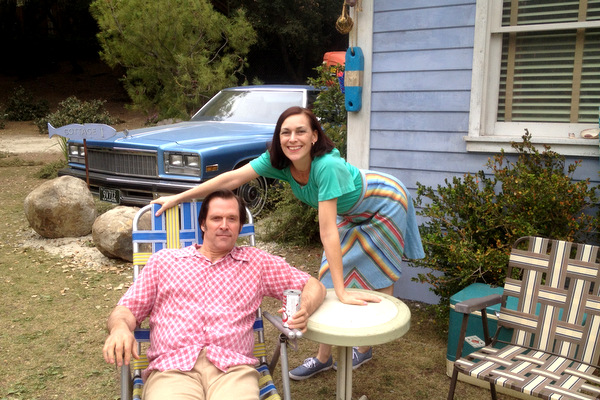
Ford Austin as Danny’s Father in Bambi Cottages
indieactivity: Tell us about your decision to go into the business of Filmmaking?
Ford: I started back when films were shot on celluloid and we had to hang film strips around our apartments to edit them. You would actually hold the movie pieces in your hands and put it together like a collage with tape.
Then, In 1999, I moved to Los Angeles to make my own movies as an artist, a Filmmaker artist. I was alone when I got here and made a couple of friends who liked to shoot videos. I decided to join the digital wave of filmmakers when no-one was saying it would work. I bought the first decent digital camera that Canon made and an apple iMac to edit and started shooting my own films. back then, there weren’t as many film festivals as there are now.
So, I got to know the straight-to-video movie distributors and producers and got a break with some of my short films to make low budget horror features for a couple different producers. My first feature film I was hired to direct in 2004 was The Curse of Lizzie Borden and I had 7 days to shoot it. Nightmare. The movie didn’t turn out too bad and I learned a ton of things!
However, I realized later that I way overshot it on a scale of something crazy like 10-1 in some scenes where I was trying to get my actors to really deliver an emotion. Even though my producers were pissed about it, they still hired me to direct and shoot four more features for them.
From there I was included in this group of constantly working indie filmmakers who were getting real distribution in stores and online before anyone else was. We felt like kings and it was way better than film school because I got paid to do it.
indieactivity: As a Producer; you work on the entire film process back to back. You never stop working? How do you combine acting and producing, two hectic roles? What has been your experience?
Ford: Great question! Since I am a Union performer, this tends to be a very difficult balance.In the 90s it was awful because SAG-AFTRA did not have contracts to support actors who wanted to make their own films like today.
Since then, opportunities have been created with the current contract options. I just wrapped three feature films where I serve as one of the main Producers and a lead actor in the films as well. Six Pack Sam, Heels and The Tragedy of JFK.
Having produced over 50 features and an uncountable amount of shorts, I knew going in, that the secret to pulling off both jobs successfully is by hiring an Associate Producer from the start to take over most of the producing while in production. this way, I can produce the movie in pre-production then hand it off to the producer I hire and train to basically be me on set as a producer so I can focus 100% on my performance. Then, once the project is in post-production, I take over the producing again.
In Six Pack Sam, this was very crucial as we shot on location in Austin, Texas while I was filming on another movie in Los Angeles, California. I hired an excellent producer in Austin and we had pre-production meetings where I showed him exactly what will be required of us in regards to our SAG-AFTRA franchise obligation during filming and he executed on my behalf. Once I got to set, I was able to really hunker down and focus on my character without being hampered with contracts, financing, location, booking, etc.
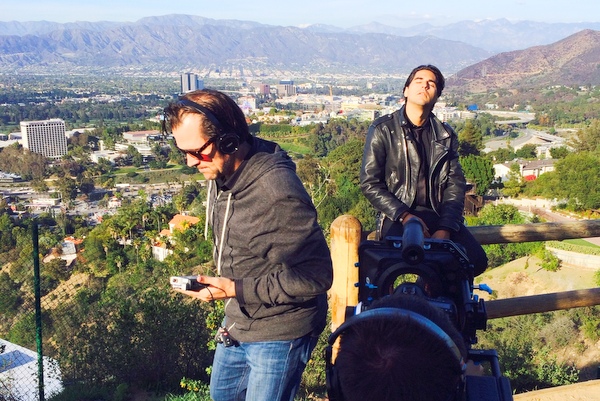
Ford Austin working on a production set.
indieactivity: How does your previous work experience feedback into a future project?
Ford: I feel that overall, each project stands alone. However, often times, you will work on a show with someone and they will come back into your life later with an idea they want to make or a job offer.
Currently, I am in pre-production on a feature shooting in Los Angeles, California three months from now because the director is a person I hired to play a walk on role in a film I shot two years ago. This person is about to shoot their first feature film and they asked are too play the lead role. Once again this is because the film community is very small.
You may think you are creating your films in a bubble thinking no-one is actually paying attention, but everyone is looking around and thinking of parts or crew jobs for everyone they had a good experience working with in the past. Also, you never know where your current film will take you.
While at a major film festival, I met a filmmaker who had the exact same idea for a movie I wanted to make. It was uncanny. We both had the idea to shot a feature film entirely in cars on the freeway. Instead of creating competing films against each other, we decided to collaborate on one film and ended up working together on movies for 10 years. That film COMMUTE turned out to be a darling on the film festival circuit that enabled us to connect with hundreds of filmmakers for years. You never know what will happen when you make your movie.
indieactivity: What is your role in taking a film to the audience? How do you get it out there?
Ford: My role as a Producer is to secure relationships with festival programmers, distributors and sales reps so I can get my motion pictures off my computer and into the screens of as wide an audience as possible. I regularly attend film markets like AFM, Cannes and SXSW to pitch my completed films for international & domestic distribution. I also conceive script ideas for all formats to then create concept artwork and sales decks to pitch to financiers from all walks of life. I especially like the journey of finding financing for features from places outside the entertainment business. I am very involved in the process of sales & distribution for all my projects.
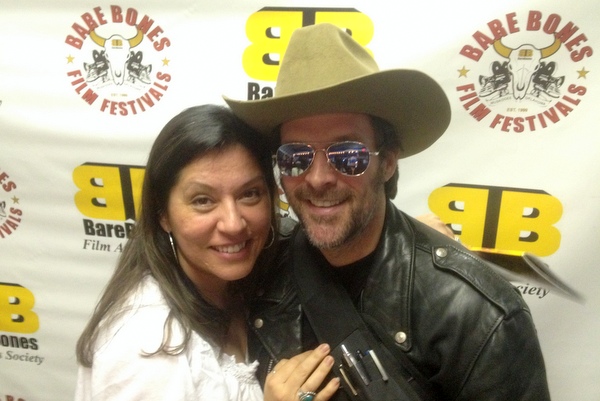
Ford Austin at Bare Bones Film Festival
indieactivity: Do you influence the story of a screenplay?
Ford: This really depends on the project. In larger projects, I am more of a pawn when it comes to having any real influence on the screenplay. But, on my own projects, I may write my screenplays myself. Also, I have envisioned complete story ideas with some dialogue and a specific outline which I pass off to writers I hire. I feel the writing process if done correctly is the most precious stage of filmmaking.
Everything starts with the script and it is beyond critical that you have your screenplay locked before the first day of shooting. I will almost never veer from the script during production so i don’t run the risk of going over on my days or wasting my precious finances. That being said, I will adjust dialogue by tweaking it to sound more natural for each performer involved. There are just too many certain ways each person speaks and sometimes the writer writes for his own voice.
Another reason I will actually make adjustments is because of what my mentor Martin landau taught me. Some writers will write all the characters in their script in the same voice, which is wrong. In life everyone has a unique voice and scripts need to reflect that.
indieactivity: How do you choose a director, if you were to choose, how do you choose?
Ford: Choosing a director is almost as hard as choosing a babysitter for your child. So many elements are at play here. You need to find a director who has a proven track record in the genre you are working in. You also need to find someone with a lot of drive and patience because you may be on location with this person at the helm for weeks, months and possibly even years. Let’s just say you like a director’s vision and previous work.
You’re dying to work with them. That is a given; only half the story. I will almost always play tennis or any sport they claim to enjoy to see how they react in the face of adversity of losing points to an opponent. If the director blows up in the middle of a match, I know they will not be very pleasant at 4am after shooting 16 hour days for 6 days straight.
Also, I tend to steer clear of directors who talk a big game about how they are “going to change the way movies are made”. Motion pictures have been done for 100 years. It would be a miracle if another person figured out how to do it differently. Long story short: I love meeting new filmmakers who have passion to make their films starring me and I often collaborate with those directors for the joy of filmmaking.
indieactivity: What basic principle drives your choice of an actor, producer, director, production designer etc.?
Ford: Once again, my mentor, Martin Landau, God rest his soul, coached and encouraged me with a few bits of advice that serve as my core approach to everything I do in the business and in life.
The first is, “Always Be Exploring.” By this he meant that every time you perform a play on stage or do another take for the camera, I should always be looking into different ways to explore the moments.
Find something fresh and new. Always be exploring for an original take that will keep the work alive and thrilling. The other gift he gave me was the concept that “If you know how to ‘swim’, you’ll never drown.”
This one is very important for all artists because it help us to stay in process without the fear of failure in our craft. I will always push my envelope as far as I can manage without being worried that I will not succeed in creating my character, directing other actors, producing the next big film or even just living my life on stage. Just remember those two things and remember to do it all your life with a happy heart.
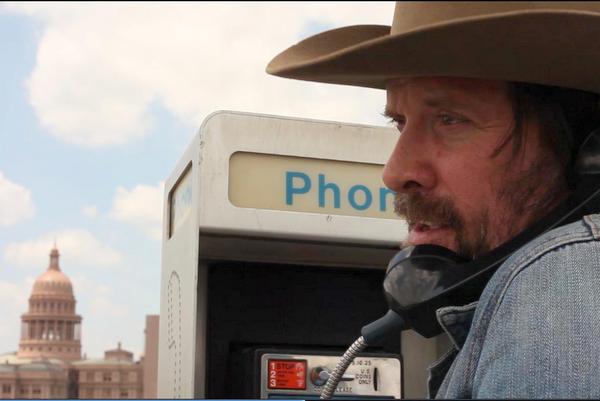
Ford Austin in Six Pack Sam
indieactivity: What advice do you give filmmakers reading this interview?
Ford: Write your script. If you can’t write, find a friend who does. Pick up your camera and start shooting. If you don’t own a camera , shoot it on your cellphone. Find a film festival near where you live, shoot movies and start submitting your work. If there isn’t one, start one. The secret to being a filmmaker is simple. A filmmaker is a person who uses the art of filmmaking to tell stories that matter to them. As long as you continue making films, you are a successful filmmaker. As long as you have something to say, keep making films.
indieactivity: Briefly describe your career in short words?
Ford: My career has spanned 40 years of ups and downs. I have some from acting to writing to directing to producing and back to acting. Mine is an eclectic career in all jobs in the world of stage and film.
I have survived years of a boatload of work and years of not one job. I started an internet company with friends that posts 11 million users today called WonderHowTo. I have also spent two years paralyzed in a wheelchair due to a terrible car crash. After recovering, I originated a role in a world premiere of a Tennessee Williams play called “A Recluse & His Guest” in New York City. I also played a guy with no lines in a no budget video shooting in a backyard in a house no one ever saw. After acting in over 130 films and performing in plays from New York City to Los Angeles and everywhere in between, I am excited to see what is next in my filmmaking life. One thing is sure: I will ‘Always Be Exploring’.
The Key Facts Behind How Jeff Nichols Made The Indie Hit MUD
Jeff Nichols gives himself directorial challenges to master on every project.
In Conversation with Michael Oblowitz Director of Confidential Informant
Confidential Informant stars Mel Gibson, Dominic Purcell, and Kate Bosworth

